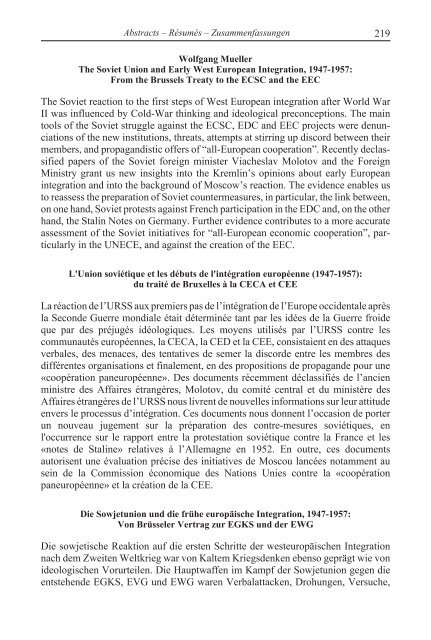Journal of European Integration History - Centre d'études et de ...
Journal of European Integration History - Centre d'études et de ...
Journal of European Integration History - Centre d'études et de ...
Create successful ePaper yourself
Turn your PDF publications into a flip-book with our unique Google optimized e-Paper software.
Abstracts – Résumés – Zusammenfassungen 219<br />
Wolfgang Mueller<br />
The Sovi<strong>et</strong> Union and Early West <strong>European</strong> <strong>Integration</strong>, 1947-1957:<br />
From the Brussels Treaty to the ECSC and the EEC<br />
The Sovi<strong>et</strong> reaction to the first steps <strong>of</strong> West <strong>European</strong> integration after World War<br />
II was influenced by Cold-War thinking and i<strong>de</strong>ological preconceptions. The main<br />
tools <strong>of</strong> the Sovi<strong>et</strong> struggle against the ECSC, EDC and EEC projects were <strong>de</strong>nunciations<br />
<strong>of</strong> the new institutions, threats, attempts at stirring up discord b<strong>et</strong>ween their<br />
members, and propagandistic <strong>of</strong>fers <strong>of</strong> “all-<strong>European</strong> cooperation”. Recently <strong>de</strong>classified<br />
papers <strong>of</strong> the Sovi<strong>et</strong> foreign minister Viacheslav Molotov and the Foreign<br />
Ministry grant us new insights into the Kremlin’s opinions about early <strong>European</strong><br />
integration and into the background <strong>of</strong> Moscow’s reaction. The evi<strong>de</strong>nce enables us<br />
to reassess the preparation <strong>of</strong> Sovi<strong>et</strong> countermeasures, in particular, the link b<strong>et</strong>ween,<br />
on one hand, Sovi<strong>et</strong> protests against French participation in the EDC and, on the other<br />
hand, the Stalin Notes on Germany. Further evi<strong>de</strong>nce contributes to a more accurate<br />
assessment <strong>of</strong> the Sovi<strong>et</strong> initiatives for “all-<strong>European</strong> economic cooperation”, particularly<br />
in the UNECE, and against the creation <strong>of</strong> the EEC.<br />
L'Union soviétique <strong>et</strong> les débuts <strong>de</strong> l'intégration européenne (1947-1957):<br />
du traité <strong>de</strong> Bruxelles à la CECA <strong>et</strong> CEE<br />
La réaction <strong>de</strong> l’URSS aux premiers pas <strong>de</strong> l’intégration <strong>de</strong> l’Europe occi<strong>de</strong>ntale après<br />
la Secon<strong>de</strong> Guerre mondiale était déterminée tant par les idées <strong>de</strong> la Guerre froi<strong>de</strong><br />
que par <strong>de</strong>s préjugés idéologiques. Les moyens utilisés par l’URSS contre les<br />
communautés européennes, la CECA, la CED <strong>et</strong> la CEE, consistaient en <strong>de</strong>s attaques<br />
verbales, <strong>de</strong>s menaces, <strong>de</strong>s tentatives <strong>de</strong> semer la discor<strong>de</strong> entre les membres <strong>de</strong>s<br />
différentes organisations <strong>et</strong> finalement, en <strong>de</strong>s propositions <strong>de</strong> propagan<strong>de</strong> pour une<br />
«coopération paneuropéenne». Des documents récemment déclassifiés <strong>de</strong> l’ancien<br />
ministre <strong>de</strong>s Affaires étrangères, Molotov, du comité central <strong>et</strong> du ministère <strong>de</strong>s<br />
Affaires étrangères <strong>de</strong> l’URSS nous livrent <strong>de</strong> nouvelles informations sur leur attitu<strong>de</strong><br />
envers le processus d’intégration. Ces documents nous donnent l’occasion <strong>de</strong> porter<br />
un nouveau jugement sur la préparation <strong>de</strong>s contre-mesures soviétiques, en<br />
l'occurrence sur le rapport entre la protestation soviétique contre la France <strong>et</strong> les<br />
«notes <strong>de</strong> Staline» relatives à l’Allemagne en 1952. En outre, ces documents<br />
autorisent une évaluation précise <strong>de</strong>s initiatives <strong>de</strong> Moscou lancées notamment au<br />
sein <strong>de</strong> la Commission économique <strong>de</strong>s Nations Unies contre la «coopération<br />
paneuropéenne» <strong>et</strong> la création <strong>de</strong> la CEE.<br />
Die Sowj<strong>et</strong>union und die frühe europäische <strong>Integration</strong>, 1947-1957:<br />
Von Brüsseler Vertrag zur EGKS und <strong>de</strong>r EWG<br />
Die sowj<strong>et</strong>ische Reaktion auf die ersten Schritte <strong>de</strong>r westeuropäischen <strong>Integration</strong><br />
nach <strong>de</strong>m Zweiten Weltkrieg war von Kaltem Kriegs<strong>de</strong>nken ebenso geprägt wie von<br />
i<strong>de</strong>ologischen Vorurteilen. Die Hauptwaffen im Kampf <strong>de</strong>r Sowj<strong>et</strong>union gegen die<br />
entstehen<strong>de</strong> EGKS, EVG und EWG waren Verbalattacken, Drohungen, Versuche,

















